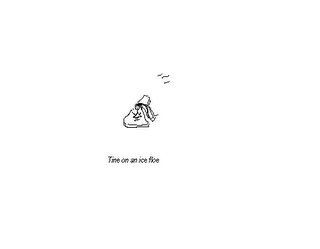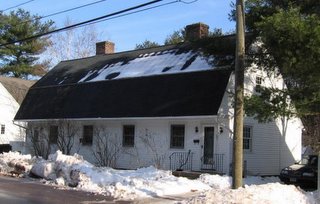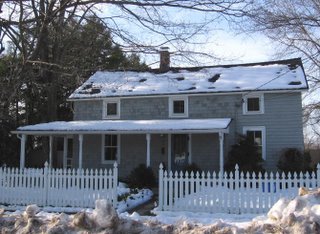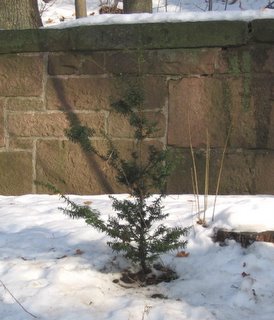Rubob and Tine set off for the cemetery on their walk today.
"The best cemeteries are those with trees, lots of shade trees -- and with views," Rubob would say later during the walk.
The cemetery by the river in Tine's village had both, so it was entirely possible that Tine and Rubob's walk would turn out to be a pleasant one today.
But Tine, who was still thinking about her close encounter with ice floes yesterday, was hoping to see neither trees nor views; she wanted to see the gravestone of someone who had "faced certain death in the river. "

"Such is the mind of Tine, alas," Rubob might have thought, but he didn't, because he was no doubt thinking of shade trees and pleasant views.
"Foone is buried in the cemetery, Rubob," Tine said, referring to one of the Africans who took over the Amistad, a slave ship, and sailed it into Long Island Sound. Tine has taken a keen interest in the story because, as some of you might already know, she loves anything pertaining to the sea, most especially sailing sagas, but also fish dinners.
"He drowned in the river, Rubob, as I nearly did yesterday," Tine said.
"But Tine, you didn't come within 100 yards of an ice floe," Rubob reminded Tine.
"That's very close when it comes to ice floes. Ice floes move very quickly," Tine said.
So Rubob tagged along, dragged by little Tine down to the cemetery.
"I often feel like Gulliver being pulled by Lilliputians," he said, "tied down with threads and strands of hair and carried on a cart."
Tine, stepping in mud on the way down her driveway, said, "Look, Rubob, filth."
Tine took particular interest in the mud, enjoying signs of a thaw after so many days of nothing but ice and snow.
"Come along, Tine. You're getting it all over your feet," Rubob said, a little impatiently.
It was trash pickup day, and they passed a tree that was doing its best to put a brave face on things.

"It's detritus, Rubob," Tine said, referring not only to the trash but to a news story Rubob had enjoyed in the newspaper several days ago.
"That's one of my favorite words, Tine: 'detritus,' Rubob had said after reading the story.
The article, "Where Fallen Trees Go in the Not-So-Silent Night," had begun:
"Tens of thousands of discarded Christmas trees now sag in green heaps at this city's curbside, joyless, desiccated, done. With boughs limp and trunks planted amid black bags of debris, they signal that January is here; deal with it."
And then came the mention of Rubob's word:
"Now, far from homes where Christmas trees slide needle-free into storage ... two men began to prowl the darkened streets of foreign neighborhoods for the holiday detritus of others."
All was not filth and detritus in the village today, however; there was more to see. Turning down Hatter's Lane, Rubob stopped to point out to Tine a sign of life in the winter, moss growing on the limb of a tree.

"Some things can survive the frost of winter," Rubob said. "I wonder why that is. "
Approaching the old hatter's cottage, now the home of the Hysterical Society, Tine and Rubob passed another abandoned Christmas tree, one that appeared less determined to resist the "trash truck's maw," as the newspaper story had put it.

Overlooking the hapless tree, on the other side of road, was Tine's favorite chimney, and she pointed it out to Rubob.

Tine then fastened her gaze on a helicopter flying high above the chimney top.

"It's the ad people," she said to Rubob. "They're watching to see where we take our walk today." (Tine had noticed that the ads on her blog often reflected the topics raised on her walks, such as tea, country walks, falling snow and Egyptian mummies. In fact, she had a hunch that the ad people were tailing Tine and Rubob. )
The two continued on their way, with Tine occasionally looking over her shoulder, and they turned the corner at the Hysterical Society.
"Look, Rubob -- it's a sign for the Freedom Trail. Foone's on the Freedom Trail. We're on the right path."

The Connecticut trail, which follows African Americans' journey from slavery to freedom, includes parts of the Underground Railroad and the Amistad Trail in Tine's village.
Tine and Rubob passed a red barn across from the old hatter's cottage, and Tine could just make out little saplings growing on the rooftop.

"Like your moss, Rubob," Tine said. "And like the Christmas tree that wasn't ready to give up."
Farther along, a cheerful denizen of the village, wearing a jaunty woolen hat, waved to Tine:

Tine and Rubob then continued around the corner and passed three cottages that old Mrs. Riddle (an architect who once lived in the village) had built for people who worked at her Hill-Stead estate.
"That one's very English looking," Rubob -- who is in fact an Anglophile -- said.

"Her work lives on in more places than the Hill-Stead, Rubob," Tine said, "and here it's lived
in, too, which makes it all the more nice."
The two arrived at the house next to the entrance to the cemtery, a pleasant little house.
"I wouldn't mind living there -- not at all," Tine said. "It's close to the river."
"But perhaps too close to other things," Rubob opined.

In the cemetery, the first grave Tine noticed was that of "Mary Jane. "

"Oh, look, Rubob, her work lives on, too, with Mary-Janes," Tine said.
"Mary-Janes?" Rubob asked.
"They're shoes, Rubob, with straps," Tine said. "Maybe she was a Miss Goodie Two Shoes."
Tine then sought to find the gravestone of Foone.
"I never can find it, Rubob. It's like trying to find one of my books. They're all over the floor. It's really no use. Everything's in disarray -- at home and in the world at large, maybe even in the next world."
"It's right here," Rubob said, interrupting Tine's lament on the disordered state of the world. (Tine takes great pleasure in disarray at times, but not when she is searching through it for something she very much wants to find.)
"This a'ways, Tine," Rubob said. "Here's the Freedom Trail marker for the gravesite."

"I hadn't noticed the lamp before," Rubob said.
"It signifies that you're my Diogenes, Rubob -- not really my Gulliver at all. You're my guiding light," Tine said, pleased that Rubob had found Foone's gravestone. "Or maybe it means that the British are coming, what with all those English cottages we passed."
As Tine stood before Foone's grave, she said, "The lamp is the light of freedom on the Underground Railroad. I'm not so silly that I don't know that. I imagine it must be very dark down there."

Tine read the plaque at the foot of the gravestone:

"He died swimming in the canal basin, where the boats docked," Rubob. "It was in the summer, so there weren't any ice floes."
"His legacy was the best of all: freedom," Tine said decisively. "We enjoy our freedom on our walks, don't we, Rubob?"
As she stood by the gravestone at midday, Rubob remarked on how long her shadow was, stretching over the snow. "You're not so little at all, Tine," he said.
"It's the shadow from your bright lantern, Rubob," Tine said.
They left the gravestone and walked to the back of the cemetery, where they could see the bend in the river in the meadows.

That's when Rubob said, "The best cemeteries are those with trees, Tine -- lots of shade trees. And with views."
Rubob noted that the graves were all pointing to the west, and he asked Tine: "Shouldn't they be pointing to the star in the East?"
"I don't know, Rubob. I think perhaps they should be pointing toward the pleasant view."
Rubob noticed a mausoleum overlooking the river and said he thought he'd had enough of graves and cemeteries for the day. "Mausoleums are particularly ghoulish," he said.

"No, I don't think I'd be quite comfortable there," Tine said. "It's nicely little for a home, nicely snug, but it looks confining. And it needs a chimney."
Rubob wandered on and noticed a gravestone marking the untimely deaths of two children:

"They hardly lived long at all," Rubob said somberly.
"Intimations of mortality, Rubob," Tine said.
"More than intimations, Tine," Rubob said.
Tine let her eyes linger on the ripples in the stream below:

"The life-living waters, Rubob," she said.
But even with the view of the river, Rubob was eager to put the cemetery behind him. Tine made one last stop, at the gravestone of Barney.

"He left quite a nice legacy, too, Rubob," she said, "though I know you don't care much for purple."
The two were soon back in the land of the living, admiring a cottage that Tine thought she might like to move into:

Tine briefly slipped back into the next world (or the previous world, as the case may be) when she saw a curiously haunting sight during the January thaw:

"Look, Rubob, the ghost of a snowman," she said.
Rubob was focused on shadows of another sort. "Look up there, Tine: The star of the East has a shadow in the window under it."

"How do you notice such things, Rubob?" Tine asked. "Even stars have shadows, I suppose, but I never would have seen that one without your pointing it out. It's your lantern, I think."
As Tine and Rubob made their way home, they passed another forlorn tree:

"Why are you stopping here, Tine?" Rubob asked.
"Detritus," Tine replied.
Not far from the detritus, Tine noticed a more uplifting sight, a tree making a nice start of things:

"It's a Charlie Brown tree, Rubob," she said, lingering fondly over it.
As Tine and Rubob neared home, Tine saw another tree, a large old butternut tree that made her recall a poem she'd memorized years ago.

"I've probably forgotten a lot of it, and I don't know who wrote it," she said to Rubob, "but here's what I remember:
"I like to see
The patience of a leafless tree
Waiting in quiet dignity
'Til spring shall set its greenness free.
I sometimes think
That living just beneath the sky
Has given it deeper wisdom
Than you and I.
It does not prate of limitation
In its sere, bare boughs;
It does not estimate the time
For fresh new leaves to reappear;
It seems to know
Within its great deep-rooted heart
That never-ending life shall flow
And new springs start."
As Tine arrived home, she thought that it had been a very somber lantern-light tour at times -- what with its venturing underground and all -- but all in all, it was a very pleasant walk.
































